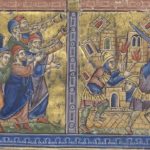We run our website the way we wished the whole internet worked: we provide high quality original content with no ads. We are funded solely by your direct support. Please consider supporting this project.

Did God Give Violent Laws? A Response to Paul Copan (#13)
In his critique of Crucifixion of the Warrior God (CWG) at the Evangelical Theological Society annual meeting in November, Paul Copan takes issue with my contention that the violent dimension of OT laws reflects God accommodating the fallen and culturally conditioned perspectives of his people at this time. In my view, God was stooping to bear the sin of his people’s fallen views of him, which is why he takes on the appearance of a rather typical ANE, law-oriented, violence commanding deity.
Against this, Copan notes that Jesus said, “The scribes and the Pharisees have seated themselves in the chair of Moses; therefore, all that they tell you, do and observe, but do not do according to their deeds; for they say things and do not do them (Mt 23:2-3).” Does not the fact that Jesus here affirms the authority of Moses and tells his audience to obey the law indicate that Jesus assumed that the entire mosaic law was directly commanded by God?
Along similar lines, the author of Hebrews casts Moses in a favorable light when he/she notes that “Moses was faithful in all [God’s] house as a servant” (Heb 3:5). So too, Paul refers to the law as “spiritual” (Rom 7:14) and as “holy and righteous and good” (Rom 7:14; I Tim 1:8). How are passages like this compatible with my view that the law to some degree reflects God accommodating sinful practices and perspectives?
In response, I’d first like to make it clear that I do not deny that the law of the OT was inspired by God or that it reflects God’s will for his people at the time. I simply maintain that what God willed for his people was the best they could do given the spiritual state of their hearts and the cultural conditioning of their minds. The law reflects God’s will insofar as the OT laws generally represent an improvement over the laws of other ANE cultures. But since God will not coercively push people beyond where their hearts and minds are willing or able to go, the law also reflects God accommodating his people’s darkened spiritual state as well as their cultural conditioning.
I frankly fail to see how the perspective I’ve just outlined is at all incompatible with the fact that Jesus and some NT authors portray Moses in a positive light and/or refer to the law was “spiritual,” “holy,” “righteous and good.” For portraying Moses in a positive light and referring to the law in these positive ways does not entail that Jesus or any NT author thought the law was ideal or perfect. Indeed, Paul and the author of Hebrews make it perfectly clear that the law is far from ideal or perfect, and this leads to my second point.
While Paul and the author of Hebrews sometimes refer to the law in positive terms, they both sometimes also refer to it in remarkably pejorative terms. For example, despite the fact that many passages in the OT celebrate the law while expressing confidence that it provides the way to be rightly related to God (e.g., Lev 18:5; Deut 4:1; 6:25; Ps 19:7; Ezek 20:11), the revelation of God in Jesus Christ brought Paul to the conclusion that one of the main reasons the law was given was to demonstrate that we cannot be rightly related to God on this basis, thereby demonstrating our need for a Savior (e.g., Gal 2:19; 3:22-4; cf., Rom 3:20; 8:3). The law, in other words, functioned like a negative object lesson leading us to Christ.
On top of this, Paul went so far as to teach that, while the law is “holy,” striving to adhere to the law puts us under a “curse,” places us in bondage “to the elemental forces of this world,” increases our sin, and puts us under God’s “wrath” (Rom 4:15; 5:20; 7:5, 8-9; Gal 3:10, 13; Col 2:20). So too, both Paul and the author of Hebrews viewed the law as a mere “shadow of the things that were to come,” for “the reality … is found in Christ” (Col 2:16; cf., Heb 10:1). And for the author of Hebrews, the very fact that people under the first covenant looked forward to a better one demonstrates that there was something “wrong with the first covenant” (Heb 8:7). So too, the very fact that God called the new covenant “new” renders “the first one obsolete; and what is obsolete and outdated will soon disappear” (Heb 8:13, cf., vv. 8-13).
In this light, it should be clear that when Paul and the author of Hebrews refer to the law as “spiritual,” “holy,” “righteous and good,” they do not mean that the law was ideal or perfect. The law is “spiritual” and “holy” inasmuch as it reflects the best that God could shoot for with his people at this time. But for the same reason, it also reflects God accommodating a great deal of his people’s sin during this time.
Finally, while Jesus held Moses in high honor, it’s also highly significant that Jesus repudiated some of his teachings. For example, while the law stressed the importance of distinguishing between “clean” and “unclean” animals (Lev 11), Jesus taught that “nothing going into a man from the outside can defile him,” thereby making “all food clean” (Mk 7:19, cf., Ac 10:15; Rom 14:4; 1 Cor 10:31).
Similarly, when Jesus was touched by a woman “who had been subject to bleeding for twelve years” (Lk 8:43), he did not rebuke her, even though the law stipulated that women with this sort of disorder were “unclean” and that anyone they touched became “unclean” and needed to bathe themselves and wash their clothes (Lev 15:25-7). In fact, Jesus her affirmed her law-defying act as an act of faith that healed her (Lk 8: 48).
Along the same lines, while the mosaic law commanded people to make oaths in God’s name (Dt 6:13), Jesus strictly forbade it (Mt 5:33-6). Indeed, he said that anything beyond a simple “’Yes’ or ‘No’…comes from the evil one” (v.37). The implication is that, while God accommodated making oaths in his name in the past, the desire to obey this law today reflects a demonic temptation.
Finally, and most importantly, the law of Moses commanded an “eye for eye” and a “tooth for a tooth” (Ex 21:24; Lev 24:19-20; Deut 19:21). In stark contrast to these laws, however, Jesus instructed people to “not resist an evil person,” adding that, “[i]f anyone slaps you on the right cheek, turn to them the other cheek, also” (Mt 5:38-9).
This should suffice to demonstrate that, as much as Jesus held Moses in high regard and considered the law good for the people of the first covenant, he clearly didn’t think this law perfectly reflected God’s real will. And I believe that this and the previous two arguments suffice to demonstrate that my accommodating perspective of the law is not incompatible with anything Jesus or anyone else says about the law or about Moses in the NT.
Photo credit: Lawrence OP on Visual Hunt / CC BY-NC-ND
Category: General
Tags: Crucifixion of the Warrior God, Cruciform Theology, Law, Old Testament, Paul Copan
Topics: Interpreting Violent Pictures and Troubling Behaviors
Related Reading

Jesus is the Center of the Story
The previous post addressed how the revelation of Christ is the surprising twist that reframes how we must read all that precedes it. Today we’ll look briefly at five supports to this claim. Jesus said, “I have a testimony greater than that of John” (John 5:36). Jesus elsewhere claims that “among those born of women…

A Cross-Centered Evaluation of Responses to Tragedy
I’d like to pick up where I left off on my previous post about Draper’s article entitled “Aurora shooting inspires various perspectives on God and belief.” Toward the end of his article, Draper reports on an informal survey conducted by Stephen Prothero on his CNN Blog. Prothero simply asks people to respond to the question: “Where…

5 Differences Between The Kingdom of God and the Kingdom of the World
Image by matthijs rouw via Flickr The kingdom of God looks and acts like Jesus Christ, like Calvary, like God’s eternal, triune love. It consists of people graciously embracing others and sacrificing themselves in service to others. It consists of people trusting and employing “power under” rather than “power over,” even when they, like Jesus, suffer because…

What I Am, and Am Not, Doing In These Blog Posts
In this post I’d like to try to help some potentially frustrated readers by explaining what I am, and am not, trying to accomplish in this series on the violent portraits of God in the OT. First let me explain something. My forthcoming book, The Crucifixion of the Warrior God, fleshes out and defends a…

Reading the Bible “by Faith”
The cruciform approach to reading the Bible—and specifically the culturally-conditioned and sin-stained portraits of God—requires faith on the part of the reader, which I argue in Crucifixion of the Warrior God. On one level we can discern by faith that often times God broke through the limitations and sin of the ancient authors, for we…

Podcast: How Does a Cruciform Hermeneutic Affect Your Reading of Homosexuality Passages?
Greg talks about accommodation, judgement, and homosexuality. http://traffic.libsyn.com/askgregboyd/Episode_0337.mp3
